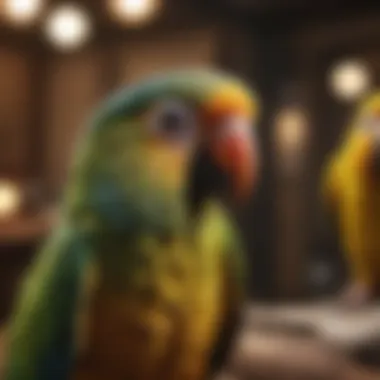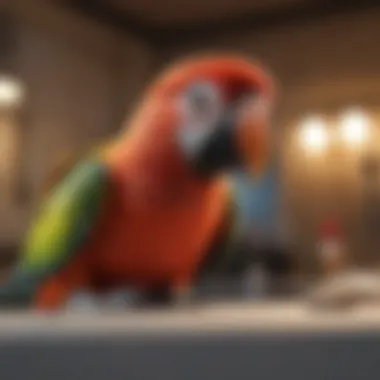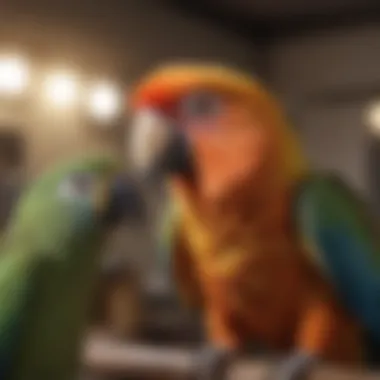Exploring CBD Benefits for Parrots and Their Care


Intro
The rise of Cannabidiol (CBD) has sparked interest in various pet care sectors, including avian health. For parrot owners, understanding the implications of introducing CBD into their birds' lives requires a thoughtful approach. CBD oil is derived from the hemp plant and does not contain the psychoactive compound found in cannabis. Its potential benefits, such as reducing anxiety, improving mood, and alleviating pain, make it an intriguing consideration for many bird enthusiasts.
Parrots are intelligent, social creatures that can experience a range of emotional and physical challenges. With the growing popularity of CBD among pet owners, it is crucial to explore its effects specifically on parrots. This article will delve into the potential benefits and safety considerations of CBD for pet birds, while also addressing proper care routines, behavior insights, nutritional guidelines, wellness practices, and enriching activities tailored to the unique needs of parrots.
As we navigate the complexities of CBD use in avian care, informed perspectives and evidence-based insights will ensure that pet owners make responsible decisions.
Care Tips
When incorporating any new treatment into a parrot's care regimen, it is essential to maintain consistent daily routines that support both the physical and emotional needs of these birds.
Daily Care Routines
Daily routines can help provide stability. These include a structured schedule for feeding, interaction, and enrichment activities. Regular handling and socialization are vital for a parrot’s well-being. Each bird is unique, and it’s important to observe and respond to their specific needs.
Cage Setup and Maintenance
An appropriate cage setup is crucial. Parrots require spacious cages with ample perches. Their environment should mimic their natural habitat to reduce stress. Regular cleaning should be part of weekly maintenance to prevent disease.
Hygiene and Cleaning Practices
Hygiene is critical. Use bird-safe cleaning agents and ensure food and water containers are cleaned daily. Removing uneaten food promptly helps maintain cleanliness.
Seasonal Care Adjustments
Seasonal changes affect parrots' needs. In winter, ensure adequate warmth; in summer, provide proper ventilation and hydration. Adjust the care routine to accommodate these needs.
Behavioral Insights
Understanding parrot behavior is essential for any owner. Parrots communicate in their unique way, and owners must learn to interpret their body language.
Understanding Bird Body Language
Observing a parrot’s posture, tail feathers, and vocalizations can reveal a lot about their mood. For example, fluffed feathers can indicate a bird is comfortable or unwell. Being attuned to these signals is crucial.
Common Behavioral Issues and Solutions
Common issues like excessive screaming or feather plucking may signal anxiety or boredom. Providing engaging toys, social interaction, and mental stimulation can effectively address these behaviors.
Positive Reinforcement Techniques
Positive reinforcement encourages desired behaviors. Treat rewards and praise can be powerful tools in guiding good behavior. This technique fosters trust and strengthens the bond between the parrot and owner.
Social Interaction Needs
Parrots are social birds. Regular interaction with their owners or other birds is necessary to prevent loneliness and depression. Create opportunities for socializing, such as playtime outside the cage.
Nutrition Guides
A balanced diet is key to a parrot’s health. Understanding their nutritional needs helps avoid health problems.
Essential Diet Components
Parrots require a varied diet that includes pellets, fresh fruits, vegetables, and nuts. This diversity supports their nutritional needs and keeps them engaged during mealtime.
Safe and Toxic Foods
It’s vital to know which foods are safe and which are hazardous. Foods like chocolate, avocados, and caffeine are toxic to parrots. Always research before introducing new foods.
Supplements and Treats
Supplements, such as vitamins and minerals, may be necessary for certain species. Natural treats can be a great addition but should be given in moderation.
Feeding Strategies for Different Species


Different species of parrots have unique dietary needs. Research species-specific requirements to provide an adequate menu that supports their health and vitality.
Wellness and Health
Health is paramount for any pet owner. Parrots should receive regular health assessments to ensure their well-being.
Routine Health Checkups
Regular veterinary check-ups are essential for early detection of health issues. Finding an avian specialist can provide tailored care.
Identifying Symptoms of Illness
Awareness of behavioral changes can help detect illnesses early. Symptoms such as lethargy, changes in eating habits, or abnormal droppings demand immediate attention.
Preventative Care and Vaccinations
Preventative care, including vaccinations where applicable, is crucial. Discuss available vaccines with your vet to keep your parrot healthy.
Mental and Emotional Well-being
Mental health is as important as physical health. Providing enrichment activities and interaction helps keep parrots emotionally balanced.
Enriching Activities
Enrichment serves as a vital aspect of avian care, enhancing both physical and mental stimulation.
Toys and Playtime Ideas
Offer a variety of toys to encourage exploration and play. Rotate toys regularly to maintain their interest and engagement.
Training and Tricks
Training parrots to perform tricks not only entertains but also strengthens the bond between bird and owner. Use patience and consistency to teach new skills.
Outdoor Activities and Interaction
Supervised outdoor time can be beneficial. Fresh air and a change in environment can positively impact their mood. Ensure any outdoor space is safe and secure.
DIY Projects for Mental Stimulation
Creating DIY toys or activities can provide mental stimulation. Simple projects can engage your parrot and encourage natural behaviors, keeping them intellectually stimulated.
Prelims to CBD and Avian Care
As the popularity of CBD continues to rise, its application in animal care draws significant attention. Parrots, like many other pets, can experience various health challenges that may benefit from alternative treatment methods. It is essential for pet bird owners and breeders to understand the potential of cannabidiol, commonly known as CBD, and how it can relate to overall avian health. This article aims to delve into this interesting intersection between CBD and avian care, underlining its significance and offering a well-rounded perspective on its use for parrots.
Understanding CBD
Cannabidiol is a compound derived from the cannabis plant. Unlike its counterpart THC, CBD does not have psychoactive properties. This makes it a more suitable option for pet care, including the care of parrots. CBD interacts with the endocannabinoid system present in most animals, including birds.
Research indicates that this interaction can potentially promote balance in various physiological processes. These include mood regulation, pain management, and inflammatory responses. While the effectiveness of CBD is widely documented in mammals, its specific effects on avian species are still predominantly based on preliminary studies and anecdotal evidence. Nonetheless, the promise shown so far invites further investigation and informs pet owners of potential benefits.
The Significance of Avian Nutrition
Avian nutrition plays a critical role in the overall health of parrots. A well-balanced diet can strengthen the immune system, lead to better feather quality, and support optimal organ function. Consequently, the introduction of CBD should not overlook the importance of nutritional considerations.
Integrating CBD into an avian's diet can be more effective when it complements a proper nutrition regimen. Parrots require a varied diet rich in vitamins, minerals, and essential fatty acids. This ensures that, in the quest to utilize CBD for beneficial effects, the birds also receive proper nourishment.
In summary, understanding both CBD and the nutritional needs of parrots provides a more holistic view of avian care. As interest grows among pet owners regarding CBD, the dialogue surrounding its appropriate use in conjunction with an avian-friendly diet is vital for fostering better health outcomes for these intelligent birds.
The Science Behind CBD
Understanding the science behind CBD is critical not only for avian care but also for grasping its potential implications for parrot health. As this natural compound gains traction among pet bird owners, recognizing its properties and effects becomes paramount. CBD, or cannabidiol, is one of many cannabinoids found in the Cannabis sativa plant. Unlike THC, another well-known cannabinoid, CBD does not produce psychoactive effects, which makes it a candidate for therapeutic applications without the "high" associated with cannabis.
This section will explore the fundamentals of what cannabidiol is, how it interacts with animal systems, specifically focusing on parrots, and its application in veterinary practices. Understanding these elements allows pet owners and veterinarians to make informed decisions about incorporating CBD into avian care.


What is Cannabidiol?
Cannabidiol is a chemical compound that has garnered attention for its potential health benefits. CBD interacts with the endocannabinoid system (ECS) in mammals, including birds. The ECS plays a vital role in regulating various physiological processes such as pain sensation, mood, and immune function. In simple terms, CBD works with this system to produce various effects that may help maintain or restore balance in the body.
Research suggests that CBD exhibits anti-inflammatory, analgesic, and anxiolytic properties, among others. These characteristics pique interest, especially for conditions such as anxiety disorders or chronic pain management in parrots.
CBD is typically extracted from hemp plants, as they contain higher levels of CBD and lower levels of THC. This lowers the risk of adverse effects while still providing beneficial properties. However, more studies are needed to fully understand how CBD affects avian species, given that research has largely focused on mammals.
Pharmacokinetics of CBD in Animals
Pharmacokinetics refers to how a substance is absorbed, distributed, metabolized, and excreted in the body. When studying CBD in animals, the absorption rate and the bioavailability are crucial factors to consider. Studies show that when administered, CBD tends to have a moderate absorption rate across various animal species.
In birds, factors such as species, age, and health can influence these pharmacokinetics. A study highlighted that when giving CBD via oil or tincture, some parrots may require multiple doses for an adequate therapeutic effect. As birds have unique digestive and metabolic systems, it remains essential to tailor CBD administration specifically for them.
In birds, the duration that CBD stays active in the system can also vary. Continuous dosing may be required to maintain the required effect, especially for chronic conditions. This necessitates discussions with avian veterinarians who can help determine the right dosage and method for administration.
Common Applications in Veterinary Medicine
The adoption of CBD within veterinary medicine is gradually expanding. While research in avian species is still limited, various applications in other animals provide valuable insights.
Common uses of CBD in veterinary medicine include:
- Anxiety Treatment: Many pets face anxiety due to various stimuli, including loud noises or separation from owners. CBD may help reduce stress and promote calmness.
- Pain Management: CBD is increasingly being used to treat pain, including chronic conditions such as arthritis or post-surgery discomfort.
- Anti-Inflammatory Treatment: Inflammation can lead to numerous health issues in pets. CBD may assist in alleviating inflammation, leading to overall better health.
- Support for Seizure Disorders: In some cases, CBD has shown promise in helping control seizures, a likely benefit for affected pets.
Integrating CBD into veterinary practices showcases the need for ongoing research tailored to avian species. Gathering data and anecdotal evidence will play a critical role in understanding how CBD can support the health and well-being of parrots.
Potential Benefits of CBD for Parrots
The increasing interest in the use of CBD in avian care stems from its potential benefits for parrots. As pet bird owners seek natural remedies for common health issues, understanding these benefits is essential. CBD, or cannabidiol, presents several opportunities for improving the well-being of parrots. This section elaborates on its relevance by analyzing key areas where CBD might be beneficial.
Anxiety and Stress Reduction
Parrots, like many animals, can experience anxiety and stress. This can arise from various factors, such as changes in environment, loud noises, or social interactions. By integrating CBD into their care, bird owners may help alleviate these stress responses.
CBD interacts with the endocannabinoid system, which plays a role in regulating mood and behavior. Some studies suggest that CBD may help create a sense of calm in animals. For parrots, this can mean reduced aggressive behaviors and a more stable demeanor. It's crucial to consider proper dosage, as even small amounts can sometimes yield noticeable improvements.
Pain Management
Pain in birds can be challenging to identify, but it can manifest through behavioral changes such as reduced activity or decreased vocalizations. CBD's analgesic properties may assist in managing pain related to injury or illness. Through its interaction with receptors in the body, CBD may help modulate the perception of pain.
Offering CBD to parrots in a formulated manner can provide comfort and enhance their quality of life. However, monitoring for signs of pain is important so that proper adjustments can be made to both the dosage and the administration.
Anti-Inflammatory Properties
Inflammation can be a major concern in avian health, significantly reducing a parrot's well-being. CBD's anti-inflammatory qualities have been highlighted in studies involving various species. Parrots suffering from conditions like arthritis or other inflammatory disorders may benefit from CBD supplementation.
Regular use may potentially aid in reducing inflammation, thereby improving mobility and overall health. While research specific to avian species is still developing, the promising results from other animals suggest a positive outlook.
Support for Chronic Conditions
Chronic conditions are not uncommon in older or ill parrots, and managing these effectively is vital for their longevity and comfort. Conditions such as kidney disease or severe arthritis can be challenging to treat with conventional medicine alone. CBD may offer a supportive role in conjunction with other therapies.
Studies involving dogs and cats have shown that CBD can provide relief from symptoms associated with chronic conditions. This includes reducing nausea and increasing appetite, both critical for maintaining health in compromised birds. Holistic approaches like this can be essential for overall management strategies, particularly in elderly birds.
Safety Considerations
When considering the use of CBD for parrots, it is critical to approach the subject of safety with due diligence. Safety considerations encompass a variety of factors that can impact the well-being of pet birds. CBD can offer potential benefits; however, it is not without risks. Understanding these risks helps ensure that parrots receive the best care while minimizing any adverse effects. The importance of proper guidance cannot be overstated when integrating CBD into avian care.
Dosage Guidelines
Establishing a proper dosage is key when giving CBD to parrots. CBD products vary in concentration and formulation; this creates different potencies that may affect dosing. Parrot owners should consult a veterinarian experienced with CBD use in birds for guidance. As a general starting point, many experts suggest beginning with low doses. For example, doses can be as low as 1-2 mg of CBD per 10 pounds of body weight.
This method allows owners to monitor the parrot’s response to CBD gradually. If no adverse reactions occur over a period, the dosage can be adjusted as necessary.
It is also wise to keep a journal to track any changes in behavior or health following CBD administration. This record aids in discussions with veterinary professionals and helps tailor treatments to individual needs.


Potential Side Effects
While CBD is generally well-tolerated by most animals, parrots may exhibit reactions. Some side effects can include:
- Lethargy or sleepiness
- Changes in appetite
- Digestive upset or diarrhea
- Dry mouth
In rare instances, more serious effects like increased anxiety or allergic reactions can occur. Observing the parrot for several hours after introducing CBD is advisable. If any side effects are noted, it may be necessary to discontinue use and consult a veterinarian. Clear communication is essential for addressing health concerns that may arise.
Drug Interactions
CBD can interact with other medications a parrot may be taking. It impacts the liver's cytochrome P450 enzyme system, which is responsible for metabolizing many drugs. Consequently, the introduction of CBD could amplify or diminish the effects of these medications. Parrot owners should discuss all medications and supplements current to their bird with a veterinarian before starting CBD.
It is crucial to reassess the treatment plan regularly to ensure optimal health outcomes for the parrot.
By considering these safety factors, pet bird owners can make informed decisions regarding the use of CBD, enhancing the quality of life while protecting their beloved companions.
Legal and Regulatory Aspects
Understanding the legal and regulatory aspects of CBD is crucial for parrot owners considering this treatment for their birds. Legislation surrounding CBD can vary significantly across regions, impacting availability and guidelines for use in avian care. Familiarity with the legal framework ensures responsible practices and informs pet owners about what is permitted, helping avoid potential legal issues. Additionally, understanding these aspects enhances trust in the quality of products used for their pets.
Current Legal Status of CBD
The legal status of CBD, particularly for use in animals, has evolved in recent years. In many countries, CBD derived from hemp is legal, while products containing THC tend to be restricted due to their psychoactive components. This distinction is vital when considering products for parrots, as they should be free from any harmful substances.
In the United States, the 2018 Farm Bill legalized hemp-derived CBD, but the Food and Drug Administration (FDA) has not yet established clear regulations for its use in animal health. Many states have their own laws, which can either support or restrict the use of CBD for pets. This creates a patchwork of regulations that parrot owners must navigate. Therefore, it is advisable for owners to check local laws before purchasing CBD products for their birds.
Regulation of CBD Products for Animals
Regulating CBD products intended for animal consumption is a complex area as well. Unlike human supplements, pet products, including those made from CBD, fall under the jurisdiction of the FDA and state agricultural departments. However, the regulations are not as stringent, leading to a variety of products on the market, which may not always meet the same quality standards as those for human consumption.
It is essential for parrot owners to seek out products that are specifically designed for animals and not simply marketed as ‘pet-friendly’. Reading labels, checking for third-party testing, and seeking products with clear ingredient lists can help ensure quality. Additionally, there is an increasing number of companies that are working to comply with good manufacturing practices and offer transparency about their formulations.
"When considering CBD for parrots, it's significant to choose products that are compliant with the current regulations to ensure safety and efficacy."
A growing awareness among consumers is pressing manufacturers to maintain higher standards. By understanding the legal and regulatory landscape, parrot owners can make informed decisions and choose products that align with both their pets’ health needs and safety requirements.
The Future of CBD in Avian Wellness
The landscape of avian care is evolving, and as pet owners increasingly seek natural remedies for their birds, the integration of CBD into parrot care practices is becoming more relevant. Understanding the future of CBD's role in avian wellness involves both scientific inquiry and personal experiences. Key considerations include the potential for further research, individual bird needs, and the responsibility of owners to stay informed about the developments related to CBD.
Research Gaps and Opportunities
Despite the promising initial findings regarding CBD for parrots, significant research gaps persist. Most studies focus on mammals, and the data directly pertaining to birds are limited. Research needs to address specific dosages, effectiveness, and long-term impacts of CBD on avian health. The lack of comprehensive studies on parrots creates an opportunity for future investigations.
To facilitate a deeper understanding of how CBD can benefit parrots, researchers might consider:
- Conducting clinical trials specifically on parrot populations.
- Investigating the impact of different CBD delivery methods, such as oils or treats.
- Exploring the interaction between CBD and common avian health issues.
Engaging veterinary experts and avian specialists in these studies can further enhance the relevance and applicability of findings.
Collecting Anecdotal Evidence
As much as scientific research is vital, anecdotal evidence also plays an important role in shaping perceptions and practices regarding CBD use in birds. Bird owners often share their experiences, highlighting both successes and challenges. While anecdotal evidence cannot replace scientific studies, it provides valuable insights into how CBD can aid parrot wellness.
Gathering this information can be facilitated through:
- Online forums and communities on platforms like Reddit and Facebook, where bird enthusiasts share their personal stories.
- Surveys conducted among parrot owners to collect diverse experiences related to CBD usage.
- Discussions with avian veterinarians who may have observed trends in their practice regarding CBD use in birds.
These shared experiences can guide pet owners toward informed decisions while waiting for comprehensive studies to emerge.
Understanding both the scientific and anecdotal landscapes of CBD in avian care is vital. It allows owners to make educated choices and fosters responsible integration into avian wellness strategies.
Culmination
The conclusion serves as a critical element in understanding the role of CBD in parrot care. This section wraps up the findings and emphasizes the importance of informed decision-making regarding the use of CBD for parrots. It is essential to summarize the key insights discussed throughout the article.
CBD has shown potential benefits for avian health, particularly in areas such as anxiety reduction and pain management. Knowing these advantages allows parrot owners to consider CBD as a natural remedy, if appropriate for their bird's needs.
Furthermore, safety considerations cannot be overlooked. Understanding dosage guidelines and potential side effects is vital to ensure the well-being of pet birds. Owners must feel empowered with accurate information to make responsible choices regarding their pets' health.
The future of CBD in avian wellness looks promising, but it requires ongoing research and anecdotal evidence to fully understand its effects. This evolving field encourages parrot owners to stay connected with veterinary professionals and to be active participants in developing optimal care practices.
Ultimately, navigating the integration of CBD into parrot care necessitates a blend of knowledge, caution, and a commitment to ongoing learning. With thoughtful consideration, CBD can become a valuable component of holistic avian care.















